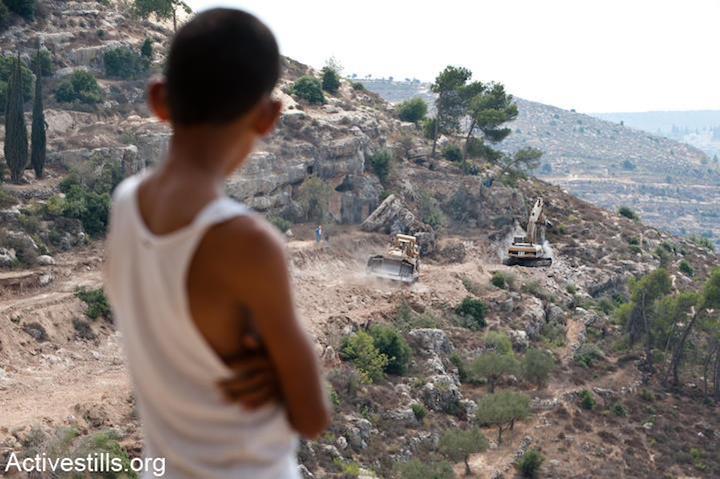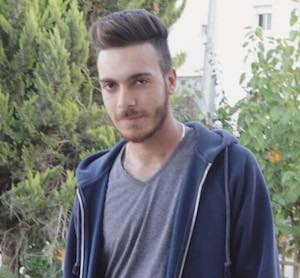Long before he died in a work accident on an Israeli construction site, Muhamad Barghouth’s life was dictated by the violent whims of military occupation.
By Aviv Tatarsky

Last month, the grandson of a very close friend of mine was killed. Muhamad Bargouth, 22, whose grandfather I have grown close to in my many visits to the Palestinian village of Walajeh over the years, was killed in an accident at an Israeli construction site not all that far from his family home. Accidents can happen. But Muhamad’s death was more than accident: his life was marked by the violence Israel’s occupation visited upon his family and village — violence that also steered his life toward that construction site where he died.
Israeli security forces arrested Muhamad’s father and grandfather in the 1990s. The two were imprisoned for several months without ever being put on trial, during which time they were tortured. Muhamad’s father never fully recovered from the physical and psychological damage.
In 2010, when Muhamad was 14, Israel began building the separation barrier on land belonging to his village, Walajeh, located in between Jerusalem and Bethlehem. The barrier cut through his family’s plot, less than 200 feet from his home. Muhamad’s teenage years were marked by explosions that blasted holes in the landscape of his childhood and Israeli bulldozers uprooting the orchards his grandfather planted. As a teenager, he had to get used to the tear gas regularly thrown and shot at nonviolent protestors demonstrating along the route of the barrier near his home. It was there that he witnessed soldiers beating and arresting his friends and relatives.
Muhamad graduated from school a few years later. Under different circumstances, he would most likely have continued on to university, as many of his peers living in the occupied territories do. He grew up with a close, supportive family, with a kind and assertive grandmother and a charismatic, open-minded grandfather who was a leader in the village council. But studies did not interest Muhamad much — that’s the way it is when you grow up with a father who survived torture, and when you experience the trauma and violence of the separation barrier snaking by your home.
Even without a university degree, Muhamad could have made a living off the land; his grandfather was a skilled farmer who carried the ancient agricultural knowledge of generations. But the Israeli government, which coveted Walajeh’s land, constructed the barrier right next to the villagers’ homes. To facilitate the construction, the authorities uprooted 180 olive trees belonging to Muhamad’s family, with dozens more ending up on the “Israeli” side of the barrier.

Many families in Walajeh faced similar, life-changing losses to their livelihoods. Israel constructed the barrier in such a way as to cut the village off from some 300 acres of its land – mostly olive terraces and a large spring. The Jerusalem municipality swiftly converted this area into a “national park for the welfare of Jerusalem residents,” on top of hundreds of acres that had already been expropriated to build the settlement of Gilo. Despite annexing Walajeh’s land, Israel did not annex the people who live on it, refusing to give them the permanent resident status held by most Palestinians in East Jerusalem. They aren’t even second-class citizens.
In my countless visits to the village over the years, I witnessed the Bargouth family’s economic deterioration. Muhamad’s grandfather and uncles, once resourceful entrepreneurs, were forced into unemployment and became increasingly hopeless. It was up to the grandsons to earn money for the family. That is how Muhamad came to work at the construction site in Israel where he died.
Occupation is not an abstract concept: the myriad ways it affects Palestinians’ lives reverberate far beyond the deprivation of self-rule. Even the violent incidents that capture media attention don’t convey its full implications. Occupation is having every aspect in one’s life dictated by the will of a foreign army.
Even Muhamad’s burial could have been dictated by the whims of the occupation. Muhamad’s family’s ancestral burial grounds were also cut off from the village by the barrier, a decision Israel’s High Court gave its stamp of approval to a few years ago.
When I visited the family the day after the funeral, I tried to imagine Muhamad’s proud grandfather having to argue with an army officer for the right to bury his grandson next to his ancestors. I tried to imagine what would be more painful: obtaining the army’s permission every time Muhamad’s parents want to visit the grave, or sacrificing the right to bury their son there so as to avoid enduring that kind of humiliation.
With trepidation, I asked Muhamad’s grandfather where they buried Muhamad. “We buried him up in the village cemetery,” far from the family’s home but at least on the “Palestinian” side of the separation barrier, he replied. “His mother would have gone crazy if his grave was so close to the house.”
Aviv Tatarsky is an Israeli activist and a researcher for Ir Amim, an Israeli NGO that works for an equitable Jerusalem. This post was originally published in Hebrew on Local Call. Read it here.

